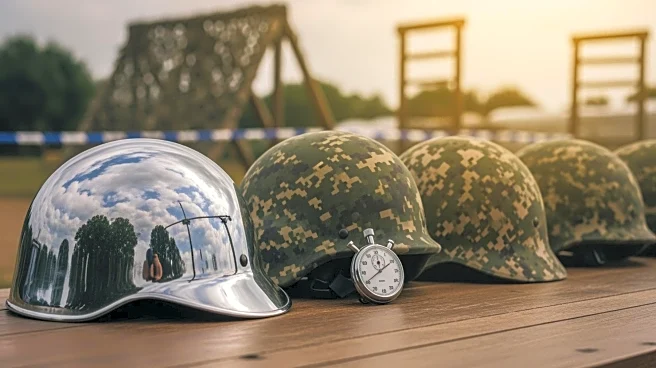What's Happening?
Soldiers from the 21st Theater Sustainment Command recently participated in challenging physical assessments to earn the Expert Soldier Badge (ESB) and Expert Field Medical Badge (EFMB) at Smith Barracks
in Baumholder, Germany. These tests included demanding drills, day and night land navigation, weapon handling, and a timed 12-mile ruck march. The ESB, introduced in 2019, offers non-infantry soldiers the chance to demonstrate proficiency in tasks similar to those required for the Expert Infantryman Badge. The EFMB is reserved for combat medics, focusing on complex medical emergencies in combat scenarios. The pass rate for the EFMB remains below 20%, highlighting the difficulty of the tests.
Why It's Important?
The rigorous testing for expert badges underscores the Army's emphasis on high standards and proficiency among its soldiers. Achieving these badges signifies a soldier's expertise and readiness, contributing to combat-ready formations. The introduction of the ESB provides more soldiers the opportunity to be recognized for their skills, fostering a culture of excellence and motivation within the ranks. This initiative may enhance the Army's operational capabilities by ensuring soldiers are well-prepared for diverse challenges, ultimately impacting military effectiveness and strategic readiness.
What's Next?
As soldiers continue to strive for these expert badges, the Army may refine the testing process to ensure it remains challenging yet attainable. The focus on proficiency and readiness could lead to further training programs and initiatives aimed at enhancing soldier skills across various domains. The Army will likely continue to evaluate the impact of these badges on soldier performance and morale, potentially expanding the program to include additional skill areas.
Beyond the Headlines
The pursuit of expert badges reflects broader themes of personal development and professional recognition within the military. It highlights the importance of continuous skill enhancement and the value placed on expertise. This focus on individual achievement may influence military culture, encouraging soldiers to pursue excellence and take pride in their capabilities. Additionally, the rigorous nature of the tests may prompt discussions on the balance between challenging standards and accessibility, ensuring all soldiers have the opportunity to succeed.









